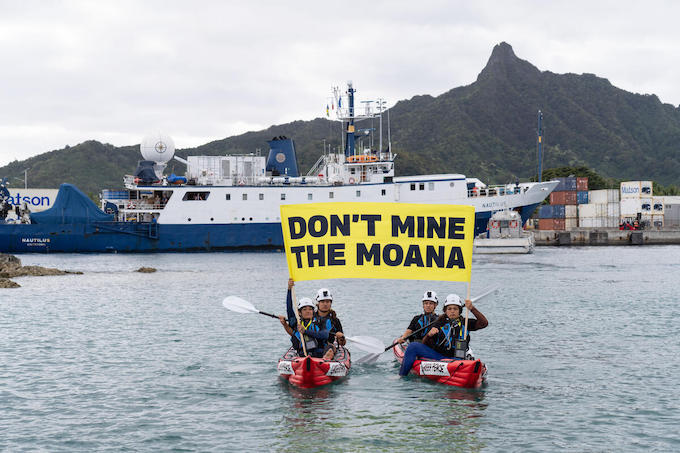
Greenpeace
Cook Islanders holding a banner reading “Don’t Mine the Moana” have confronted an exploration vessel as it returned to Rarotonga port today, protesting the emerging threat of seabed mining.
Four activists in kayaks paddled alongside the Nautilus, which has spent the last three weeks on a US-funded research expedition surveying mineral nodule fields around the Cook Islands in partnership with the Cook Islands government.
The Nautilus expedition comes just six months after President Donald Trump signed an Executive Order to expedite deep sea mining, tasking the National Oceanic and Atmospheric Administration (NOAA) to fast track the licensing process.
The research conducted on the Nautilus expedition was funded by NOAA’s Ocean Exploration Cooperation Institute.
Campaigners against seabed mining are calling the expedition one of the first steps in the Cook Island-US partnership on their critical minerals deal which was announced in August, and say it demonstrates the political motive behind the expedition is to advance seabed mining.
Louisa Castledine, Cook Island activist and spokesperson for the Ocean Ancestors collective, said the Pacific movement against seabed mining was strong and mining enablers were not welcome.
“Right now global superpowers like the US are vying for control of deep sea minerals throughout the Pacific, in an attempt to assert their military might,” she said.
Traditional life ‘at risk’
“Seabed mining will lead to the destruction of our home environments and put our Indigenous rights, cultural ways of living, and wellbeing at risk. Any government or corporate looking to exploit us in this way is no true partner of ours.”
Castledine said Cook Islanders needed to open their eyes to the threats imposed by the seabed mining industry and stop the corporate takeover of our ocean.
“We have long endured environmental and political injustices, brought about by colonialism, that forcefully displace and compromise our way of living and survival.
“We are taking a stand against the exploitation of our people and resources. As Indigenous peoples and custodians of the ocean we say NO to seabed mining.”
In August, the US and Cook Islands governments announced their official partnership on developing seabed mineral resources. A senior official at the Cook Islands Seabed Minerals Authority described this research vessel expedition as “a first step in our collaboration”.
Two of the three deep sea mining exploration licences in the Cook Islands’ EEZ waters are held by US companies.
Seabed mining is an emerging destructive industry that has not started anywhere at commercial scale. If it goes ahead, seabed mining within Cook Islands waters could pave the way for mining throughout the Pacific.
Pacific ‘blue line’
Greenpeace Aotearoa is also campaigning to stop seabed mining before it starts.
Campaigner Juressa Lee said:”We’re here today, standing alongside our allies in the Cook Islands, who like many across the region want a Pacific blue line drawn against this destructive industry.
“Just like Greenpeace stood with Pacific peoples in the fight against nuclear testing, we will continue to ally with them against this reckless industry that is gambling with our future.
“The Nautilus, which was confronted today, is doing exploration for the US. Pacific people will not be sidelined by corporations and powerful countries that try to impose this new form of extractive colonialism on the region.”
Further south in the Pacific in Aotearoa, Trans-Tasman Resources is seeking consent to mine the seabed off Taranaki, despite fierce opposition from local iwi, community groups, NGOs and more than 50,000 New Zealanders.
“People here in the Cook Islands face the same fight we’re up against in Aotearoa. In both cases, Indigenous peoples are leading the resistance against seabed miners, to protect ancestral territories and waters for future generations. Together we will resist them every step of the way,” Lee said.
More than 940 leading marine science and policy experts from over 70 countries have raised concerns about deep sea mining, and are calling for a precautionary pause on the start of deep sea mining to allow time to gather more scientific information on deep-sea biodiversity and ecosystems.














































